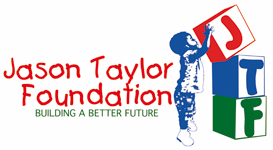
[image src=”https://jasontaylorfoundation.com/wp-content/uploads/2017/10/donate-jason.jpg” shape=”img-rounded”]
Intrinsic Benefits to Middle Schoolers Through Literary-Based Programming
By Althea Gibbons – SVE Teacher in Broward County Public Schools / Teacher at the Jason Taylor Reading Room
My experience as a teacher of middle school students has taught me that, at this age, with respect to their intellect, students display a wide range of individual intellectual development as their minds experience transition from the concrete-manipulatory (ex: counting objects and matching letter sounds with objects that begin with that letter) stage to the capacity for abstract thought. They are intensely curious, prefer hands-on learning experiences as opposed to being lectured, they favor interaction with peers during learning activities, exhibit a strong willingness to learn things they consider to be useful; enjoy using skills to solve real life problems, are egocentric, argue to convince others; exhibit independent, critical thought. At this level they consider academic goals as a secondary level of priority; personal social concerns dominate thoughts and activities.
In terms of their social development, students experience often traumatic conflicts due to conflicting loyalties to peer groups and family, they refer to peers as sources for standards and models of behavior; media heroes and heroines are also singularly important in shaping both behavior and fashion. They may become anxious and disoriented when peer group ties are broken because of family relocation to other communities They may also act unusual or exhibit drastic behavior at times; may be aggressive, daring, boisterous, argumentative. Additionally, they may, challenge authority figures; test limits of acceptable behavior.
In short, students at the middle school level experience a plethora of intellectual and social changes that affect them both on an academic and personal level. Given these challenges, the Jason Taylor Reading Room program takes all of these changes into consideration when creating and implementing the curriculum.
I have encountered a number of students in our program who, when they entered, despised reading and would rather do anything other than that. However, we have introduced a series of books, The Bluford Series, that deals with everything that adolescents deal with on a day-to-day basis, including, but not limited to, all of the aforementioned developments and intellectual and social changes, which draws them in and has them excited about the next chapter. They love to discuss and debate about events that have happened throughout the chapters, as well as making predictions about the rest of the book. Some of the students even get upset when it’s time for them to leave if we are still reading. The series is based on fictional characters who are in middle and high school and touches on everything from a variety of positive and negative social interactions among the students to family issues, and internal struggles that the average adolescent faces. This series gives them examples and nonexamples of the way to conduct themselves in certain situations and shows them the consequences for making certain decisions and that following the crowd doesn’t always yield positive results. The students have shown progress in their abilities to confidently read aloud more fluently and comprehend what was read.
Our curriculum involves healthy debates on topics based on current events, social media and even some student selected topics. This allows our student to use their argumentative nature positively. They learn how to take a stand on a topic and support it and/or disprove the opposing view. The students also participate in activities that address multiple modalities of learning. Some of our students are auditory learners (they learn by hearing), visual learners (they learn by seeing), kinesthetic (they learn by doing) and tactile learners (they learn by touching). The activities that we implement involve everyone’s learning style to ensure success. We also give real-world examples so that the student can relate and better understand the how and why of the topics being discussed.
In conclusion, I have seen many students make tremendous gains and improve and increase their confidence levels, as well as their love of reading. This program is definitely beneficial to the students who attend. I am proud to be a part of such an amazing organization, as we spread the love of literacy one student at a time.
TO MAKE A CONTRIBUTION TO SUPPORT THE READING ROOM
PLEASE CLICK HERE
If you or your company are interested in supporting the Jason Taylor Foundation and any of its transformative programming, please email us at info@jasontaylorfoundation.com, call us at 954.424.0799 or follow us @jtfoundation99 or @bluapplepoetry.
About the Author
Althea Gibbons has been a teacher in Broward County Public Schools for more than thirteen years and has been with the Jason Taylor Reading Room since opening its doors in August of 2007. Ms. Gibbons is currently a teacher of special education and instructs students in a Specialized Varying Exceptionalities (SVE) class , in a self-contained Varying Exceptionalities (VE) class as well as students with mental and physical disabilities in a Mentally Handicapped (MH) Cluster. Althea has developed curriculum to accommodate different learning styles, maximizing student comprehension and learning while teaching reading, math, language arts, science and social studies.
Ms. Gibbons is certified to write Individualized Education Plans (IEPs), administer diagnostic assessments in all academic areas, administer assessments to the FCAT and in the implementation of classroom management.




